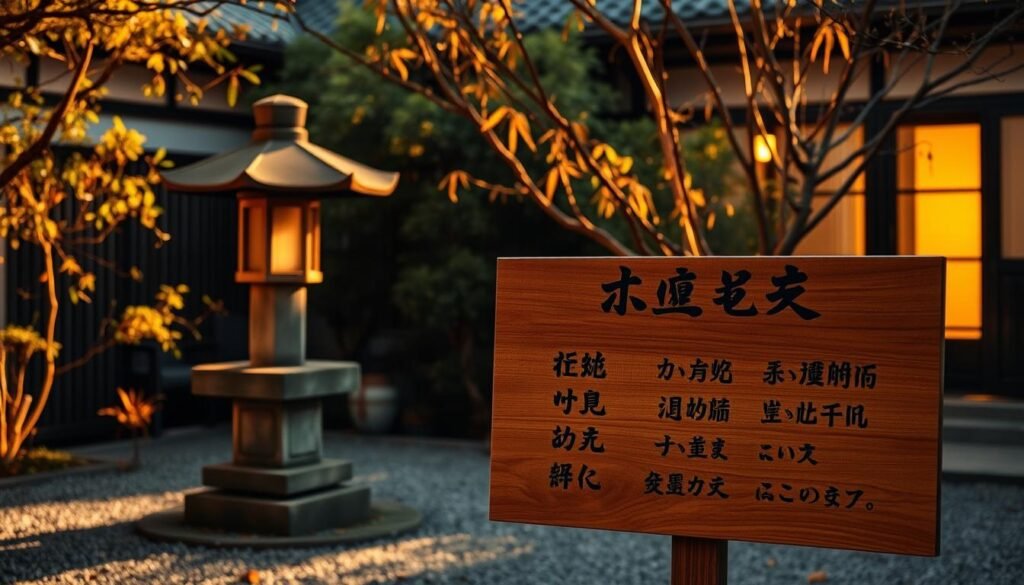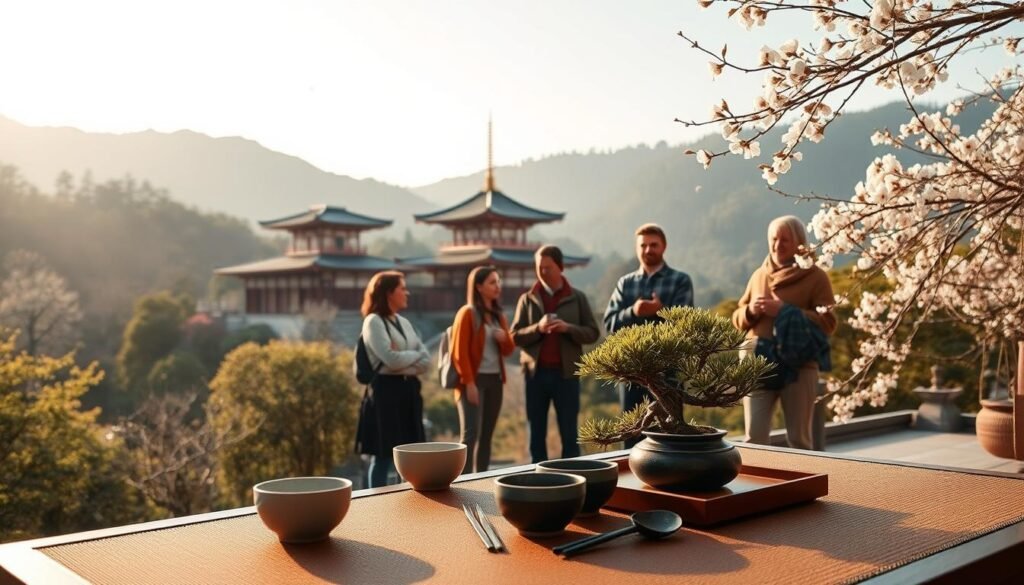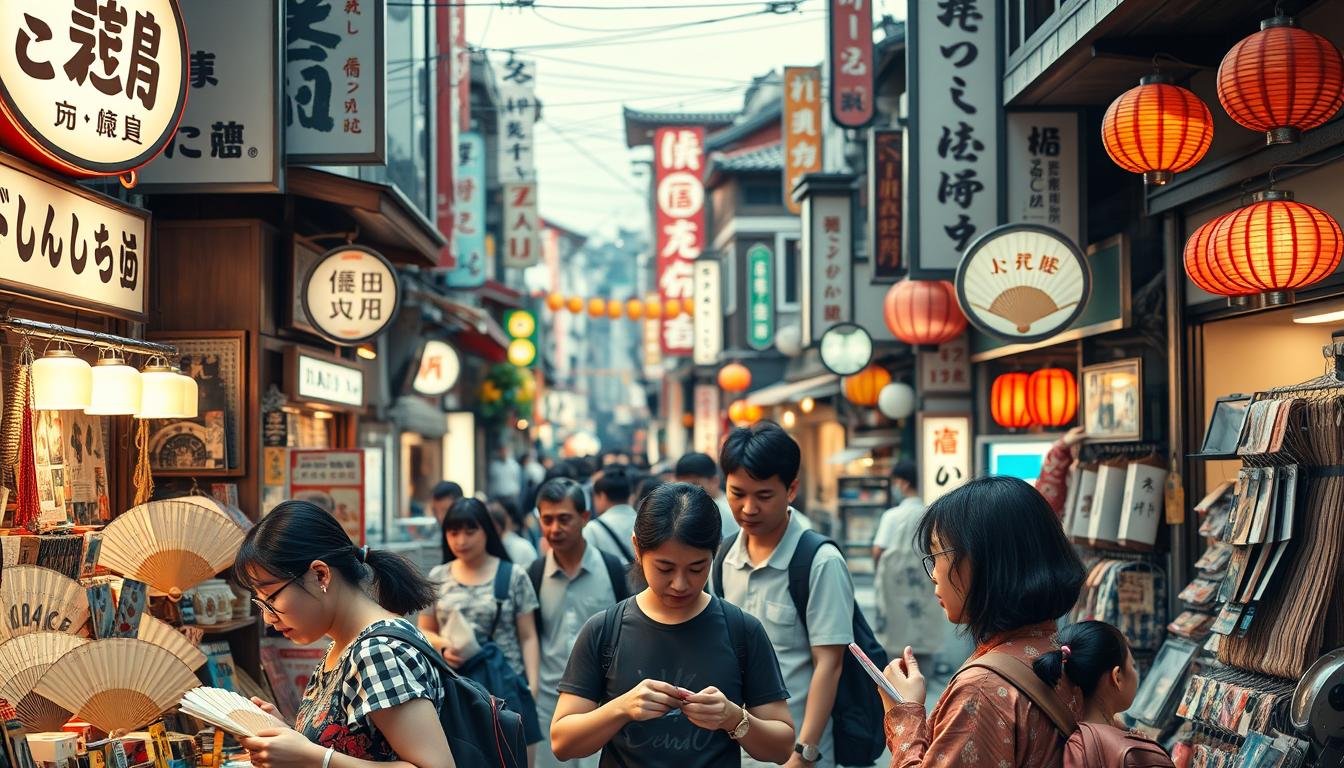Exploring Japan gets easier with key Japanese phrases for travelers. Saying “konnichiwa” (hello) or “arigatou” (thank you) shows respect and curiosity. These phrases make everyday interactions memorable, helping you dive into local life beyond tourist spots.
This guide offers practical language tips. It covers greetings, polite expressions, and emergency terms. It ensures you feel ready and confident during your visit.

Key Takeaways
- Learning essential Japanese phrases for travelers builds confidence and cultural respect.
- Key phrases simplify daily tasks like ordering food or asking for directions.
- Phrases covered include greetings, polite expressions, and emergency terms.
- No fluency needed—focus on practical communication for travel success.
- Free digital tools and visual aids make learning these phrases quick and easy.
Why Learning Basic Japanese Enhances Your Travel Experience
Traveling to Japan is more rewarding when you know a few words of Japanese. Saying ”Konnichiwa” (hello) or ”Sumimasen” (excuse me) shows respect. These must-know Japanese phrases are not just useful—they honor Japan’s culture.
Cultural Appreciation Through Language
Language and culture are closely linked. Saying ”Ohayou gozaimasu” (good morning) shows Japan’s value on politeness. Learning basic Japanese phrases for tourists helps understand everyday interactions. It shows respect and builds connections.
Going Beyond Tourist Areas
Many hidden spots are off the main path. Asking ”Eeto, koko kara…?” (Excuse me, where is…?) can lead to local gems. Simple phrases like ”Mou ichido onegaishimasu” (Can you repeat that?) help navigate places not in guidebooks.
Building Meaningful Connections with Locals
A simple “thank you” in Japanese (arigatou) can start a conversation. Locals might share secrets, like hidden ramen spots or festivals, if you show interest in their language. Saying ”Douzo yorirukute arigatou” (Thank you for welcoming me) turns simple interactions into meaningful moments. These small exchanges can lead to deeper connections and invitations to explore more.
Learning a dozen phrases can open Japan’s heart to you. Even mistakes are met with kindness, showing that language is a bridge to real experiences.
Japanese Pronunciation Guide for English Speakers
Learning to pronounce Japanese words can make useful japanese expressions for travelers more meaningful. Even small steps are appreciated in Japan. Here’s a simple guide to begin:
| Japanese Vowel | Example Word | English Approximation |
|---|---|---|
| A | Arigatou | Like the “a” in “father” |
| I | Itadakimasu | Short “ee” as in “see” |
| U | Uchi (house) | Like the “oo” in “food” |
| E | Eki (station) | Similar to the “ay” in “say” |
| O | Onegaishimasu | Like the “oh” in “oh yes” |
- R/L blend: The Japanese “r” is a soft flick of the tongue—try saying “arigatou” (thank you) with a light R sound.
- Long vowels: Hold vowels twice as long. For example, “ohayou” (good morning) becomes “oh-hah-yoh”.
- Double consonants: Pause slightly between syllables. “Konnichiwa” (hello) splits into “ko-nni-chi-wa”.
Practice phrases like common japanese words and phrases like “sumimasen” (excuse me) with a nasal N sound. Try “onegaishimasu” (please) by stressing the second syllable. Focus on rhythm over perfection!
Japanese speakers value effort, not precision. Start with short drills using travel phrases. Your attempts to speak will brighten every interaction—practice out loud today!
Essential Japanese Phrases for Travelers: The Absolute Basics
Learning basic phrases makes travel exciting. Start with japan travel language essentials for easier interactions. These phrases help with ordering food, asking for directions, or shopping.
Greetings for Different Times of Day
- Good morning: Ohayou gozaimasu (おはようございます) – Use until noon.
- Good afternoon: Kon’nichiwa (こんにちは) – Common daytime greeting.
- Good evening: Konbanwa (こんばんは) – After sunset.
- Goodbye: Sayōnara (さようなら) – Save for final farewells.
Politeness and Thank You Expressions
In Japan, being polite is key. Use:
- Thank you: Arigatou gozaimasu (ありがとうございます) – Formal gratitude.
- You’re welcome: Do itashimashite (どういたしまして) – Standard reply.
- Excuse me: Sumimasen (すみません) – For getting attention or apologies.
Key Question Words to Know
Ask questions confidently with these:
- What? Nani ( )
- Where? Doko (どこ)
- When? Itsu (いつ)
- How much? Ikura desu ka (いくらですか)
Numbers and Counting in Japanese
Numbers 1-10 are crucial for prices and quantities:
- 1: Ichi ( )
- 2: Ni ( )
- 3: San ( )
- … up to 10: Juu ( )
Learn 100 (Hyaku) and 1000 (Sen) for larger amounts. Practice counting with items like san-ben (3 times) or niji (2 people) to grasp counters.
These japanese language phrases for trips make daily interactions easier. Use visual aids like phrase cards for quick recall.
Transportation Talk: Getting Around Japan With Confidence
Learning handy Japanese phrases for tourists makes traveling easier. Japan’s trains and taxis are very reliable. But, knowing the right words makes every journey smoother.
These essential Japanese vocabulary for traveling phrases help a lot. They clear up confusion when buying tickets or reading station maps.
Train and Subway Vocabulary
- Eki (station) – Look for this sign to find platforms.
- Kippu o kudasai (Please give me a ticket) – Use this at automated machines.
- Nan-ji ni demasu ka? (What time does it depart?) – Ask staff for schedule details.
Taxi Phrases That Save Time
Japanese taxis are easy to use, but clear communication is key. Say “Koko made onegaishimasu” (Please stop here) to end your ride. To check the fare, ask “Matome wa ikura desu ka?” (How much is the total?) before you get in.
Pointing to a landmark like “Ginza e ikitai desu” (I want to go to Ginza) helps if you can’t remember the address.
Asking for Directions Like a Local
Locals appreciate it when you try to speak their language. Point to a map and ask “Koko made nanben desu ka?” (How many minutes is this place?). For directions, listen for migi (right) or hidari (left).
Always say “Hontou ni arigatou!” (Thank you very much!) to show your thanks.
Practice phrases like “Eki made ikura desu ka?” (How much to the station?) for real-life situations. Using these phrases builds your confidence, making Japan’s transport system feel like home.
Restaurant and Food Phrases You’ll Use Daily
Learning a few essential Japanese phrases for travelers makes every meal special. Start with “omakase onegaishimasu” (please recommend) to find local dishes. Ask about ingredients with “kasei wa?” and confirm allergies with “ariari”. These japanese travel phrases help you connect with the culture.
- Request a table: “sutādo o yosokusimasu”
- Ordering: “kore o” (I’ll have this)
- Payment: “harai wa doko desu ka?” (Where is the payment?)”
| Scenario | Japanese Phrase | Romanization | English Meaning |
|---|---|---|---|
| Recommendation | osusume wa nan desu ka? | osusume wa nan desu ka? | What do you recommend? |
| Dietary restriction | kasei no kekkonsa wa arimasu ka? | kasei no kekkonsa wa arimasu ka? | Are there allergens? |
| Thank you for the meal | gochisousama deshita | gochisousama deshita | Thank you for the meal |
At conveyor belt sushi, just point and say “kore o onegaishimasu.” For family-style meals, ask “taberaremasu ka?” to see if something is available. Don’t forget “sumimasen” to get staff’s attention. These phrases open doors to all kinds of food, from street stalls to fancy kaiseki. Practice them every day to enjoy Japan’s food to the fullest.
Shopping and Money Expressions for Stress-Free Transactions
Learning a few must-know Japanese phrases makes shopping in Japan fun. Whether you’re looking for souvenirs or tax refunds, these basic Japanese phrases for tourists help a lot. Start by asking politely about prices and what you like.

Bargaining and Price Inquiries
Most shops have fixed prices, but some markets like Nishiki in Kyoto let you negotiate. Here are some polite phrases to use:
- “Ikura desu ka?” (How much is this?)
- “Chotto yasuku shite kuremasen ka?” (Could you make it a bit cheaper?)
- “Rebatesu ga dekimasu ka?” (Is a tax refund available?)
Size, Color and Preference Vocabulary
Looking for clothes? Remember these phrases to avoid mistakes:
- Size: “chuusuu” (medium), “moto” (original size)
- Colors: “aoi” (blue), “pinku” (pink)
| US Size | Japanese |
|---|---|
| Small | “sm” or “chiisai” |
| Large | “lg” or “ookii” |
Shopping Emergencies
If your card is declined or you need a warranty extension, these phrases help:
- “Kaedashi wa dekimasen ka?” (Can I get cash back?)
- “Yuusouki desu ga…” (This is a defective item…)
- “Yubin ni uketorokute” (I’d like to ship this)
Always use a tray when paying. For tax refunds, ask if they accept “Taakushaa” (Tax Free). These phrases and customs make shopping easier.
Emergency and Health-Related Japanese Vocabulary
Traveling confidently means being ready for unexpected moments. Useful Japanese expressions for travelers in emergencies help you communicate clearly during health issues or urgent situations. Learning these phrases will help you navigate medical care smoothly.
Medical Terms and Symptoms
Use these common Japanese words and phrases when describing your health:
- Kibun ga warui (I feel unwell)
- Atama ga itai (Headache)
- Nerai ga ii (Dizzy)
- Onaka ga itai (Stomach pain)
Pharmacy and Medication Phrases
Ask for help with these phrases:
- Kusuri no koukoku wa ikura desu ka? (How much does this medication cost?)
- Uso no atode no yakuin o kudasai (Please give me pain relief)
Note: Japanese pharmacies often require payment upfront. Always confirm dosage instructions clearly.
Getting Help in Urgent Situations
- Call 119 for ambulances or 110 for police emergencies.
- Shout Tasukete kuremasu ka? (Can you help me?)
- Show written phrases if speaking is difficult.
Cultural tip: Hospitals may ask you to remove shoes. Carry indoor slippers for visits.
Practicing these phrases ensures you’re ready to communicate calmly, even in stressful moments. Remember, clarity in emergencies can make all the difference.
Cultural Etiquette: When and How to Use Specific Phrases
Learning japan travel language essentials is more than just words. It’s about knowing when to use them. For instance, saying “arigatou gozaimasu” (thank you) shows respect. But, its formality is key. Use it with strangers or those you respect; with friends, a simple “domo” is better.
- Gift-Giving: Give gifts with both hands. Say “kureteありがとうござimasu” (thank you for this gift) to show gratitude.
- Business Cards: When you exchange meishi (business cards), take them with both hands. Say “yoroshiku onegaishimasu” to start a good relationship.
- Temple Visits: Bow slightly before entering. Say “onegai shimasu” when making an offering to show respect.

Non-verbal cues are important too. Bowing angles show respect: 15 degrees for friends, 30 degrees for respect. Don’t point with your fingers; use your whole hand. Silence is valued in talks; pauses show you’re thinking.
Don’t say “iie” (no) too firmly. Instead, say “soredewa muzukashii desu” (that’s difficult) to decline nicely. People value your effort, not perfection. So, don’t worry if you get the formality wrong. Your effort to use japanese language phrases for trips with cultural awareness will make connections meaningful.
Digital Tools and Apps to Support Your Japanese Language Journey
Technology makes learning handy Japanese phrases for tourists simpler. Apps and tools turn your phone into a language buddy. Check out these digital tools to practice and get essential Japanese vocabulary for traveling anytime.
Offline apps keep you connected, even without Wi-Fi. They help you communicate better with locals and feel more confident while traveling.
Offline Translation Resources
Translate words instantly with these apps:
| App Name | Features | Best For |
|---|---|---|
| Google Translate | Offline language packs, text-to speech | Quick translations of essential japanese vocabulary for traveling |
| Jisho | Dictionary with example sentences | Looking up phrases on the go |
Pronunciation Apps Worth Downloading
Apps like Forvo and Anki help with speaking. They use voice recognition to compare your pronunciation with native speakers. Great for learning phrases like “sumimasen” (excuse me) or “arigatou gozaimasu” (thank you).
Visual Phrase Cards for Your Phone
Use apps like Memrise or Flashcard Hero for visual learning. They show phrases with images. Visual learners can study handy Japanese phrases for tourists with colorful cards on your device. Most apps let you download packs for offline use.
Combine these tools with phrases from earlier sections. Apps like Lonely Planet Phrasebooks offer audio, text, and images for quick reference. Choose apps with offline access to save on data costs in Japan.
Conclusion: Embracing the Japanese Language Adventure
Learning essential Japanese phrases for travelers opens doors to experiences you won’t find on guidebooks. Even basic greetings like “Konnichiwa” or asking “Eki wa doko desu ka?” (Where is the station?) can transform interactions with locals. These japanese travel phrases aren’t just words—they’re bridges to Japan’s culture and daily life.
Start small. Practice numbers and polite expressions using apps like Duolingo or Anki. Flashcards for key terms like “Arigatou gozaimasu” (thank you) can fit into daily routines. Every phrase learned builds confidence, turning unfamiliar streets into navigable paths and meals into shared stories.
Remember, locals appreciate effort. A simple “Sumimasen” (excuse me) shows respect, making encounters feel genuine. Use apps offline to review phrases about transportation or emergencies before departure. Small steps today mean smoother adventures tomorrow.
Japan’s charm lies in its details—the nod from a shopkeeper, the smile when you order coffee correctly. The phrases you’ve learned become part of your journey, not just tools. Let them guide you beyond tourist spots into moments only locals know.
Before you go, print or save that “Yoi tabi o!” (Safe travels!) card. It’s more than a phrase; it’s a promise to embrace the adventure fully. Your next trip won’t just be seen—it’ll be spoken.
FAQs
1. What are the most essential Japanese phrases for travelers?
You should know basic greetings like “Konnichiwa” (Hello) and “Arigatou gozaimasu” (Thank you). Also, learning to ask “Eigo o hanasemasu ka?” (Do you speak English?) is helpful. These phrases will make your trip to Japan better.
2. How can learning Japanese enhance my travel experience?
Learning Japanese lets you dive deeper into the culture. You can explore more than just tourist spots. Plus, you’ll connect with locals, getting unique tips and experiences.
3. Are there any digital tools or apps to help me with Japanese language learning?
Yes! There are great apps for offline translation, pronunciation, and visual phrases. They’re perfect for quick access to key phrases, helping your learning.
4. What should I know about Japanese pronunciation?
Japanese sounds are easy for English speakers to learn. Focus on the five vowel sounds and tricky sounds like ‘r.’ Practice with phonetic spellings to improve.
5. How can I communicate effectively when using public transportation in Japan?
Knowing train and subway terms is key. Phrases like “Kono densha wa doko ni ikimasu ka?” (Where does this train go?) are helpful. Also, figuring out ticket machines will make traveling easier.
6. What phrases do I need for dining out in Japan?
You’ll need phrases for ordering (“Kore o kudasai” – I’ll have this) and asking for recommendations. Knowing these will make your meals more enjoyable and let you enjoy Japan’s food culture.
7. Are there specific phrases for shopping in Japan?
Yes! Learn how to ask about prices, sizes, and colors. This will help you shop more confidently and talk with shopkeepers.
8. What should I do in case of a health emergency while in Japan?
Know basic medical terms and how to describe symptoms or ask for help. Phrases like “Byouki desu” (I am sick) or “Shiyakusho wa doko desu ka?” (Where is the city hall?) are crucial in emergencies.
9. How important is cultural etiquette when using Japanese phrases?
Cultural etiquette is very important! Knowing when to use polite language and practicing good manners, like bowing, will improve your interactions with locals.
